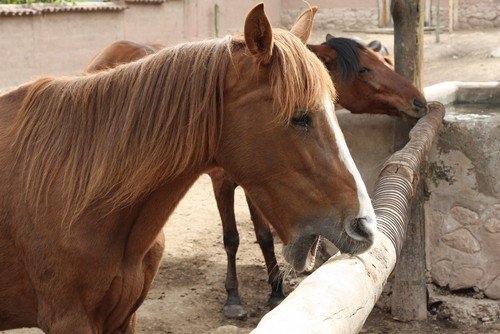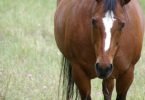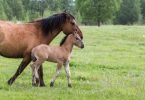Horses are one of the most intelligent animals. However, they usually develop many bad habits due to frustration or boredom. One of the most common habits that horses develop is chewing wood. Horse chewing wood not only damages the wood but also create various problems for the horses. Horse chewing wood can be due to vitamin deficiencies, but, mainly, it is due to frustration or boredom.
To know more about different behavior problems in horses, click this article “Most Common Behavior Problems in Horses“.
What is wood chewing?
Wood chewing means horses, chewing various kinds of wood around their surroundings. Horses chew wood in their stables, stalls, fencing, or trees. Horses chewing wood shows that horses are not getting enough amount of food or fiber they require in their diet. So they choose to chew wood. Some wood contains chemicals that may be harmful to horses and result in various health issues.
Apart from this, there are some poisonous trees. If the horse chews the wood of such trees, then it may result in serious health problems. The horse may become ill or sick. If the horses are restricted to a particular area or stall for an extended period, then they may develop various bad habits and behavioral issues. One should allow horses to live naturally and provide a nutrient-rich diet. Give them plenty of opportunities to socialize and allow them to move and play. If your horse is happy, then there are fewer chances of developing habits and behavioral issues such as wood chewing.
Horses chewing wood is one of the most common issues that is usually faced by most horse owners. The frequently asked question by various horse owners is, “why is my horse chewing wood”? Here are various reasons why horses chew wood.
This behavior arises due to the unnatural environment of frustration — some of the reasons behind horses chewing wood.
Boredom
When horses are kept in stalls or kept secluded from other horses, they may get bored. And to do something, they may start chewing wood or fences. Horses chew wood fence when they get bored and do not have anything to do.
Nutritional deficiencies
Another reason horses may chew wood is nutritional deficiencies. Lack of vitamins causes a horse to eat non-edible items to fulfill the deficiency. The development of such a habit is commonly known as pica. It indicates a serious nutritional deficiency or hormonal problem.
Habit
Some horses may develop a habit of eating wood. They may have developed this habit by seeing other horses in the stable. It is quite a tricky situation as it is difficult to train the horse and remove its wood chewing habit. Such training may involve more than one horse.
Insufficient feed
Sometimes horses do not get a sufficient amount of food they require. So, due to insufficient feed, they chew wood. It is another reason behind horse chewing wood.
Some other reasons behind a horse chewing wood.
- Change in activity level
- Low quality of pasture
- Over confinement
- Inadequate fiber and vitamins in the diet
- Frustration
How to stop your horse from chewing wood?
Keep your horse outdoors
Keeping horses inside the stable most of the time gets them bored or frustrated, which leads them to develop bad habits like wood chewing. Horses may not get enough space or food to eat at the stalls. They may get bored indoors. Keeping your horse outside and allowing it to live naturally with other horses with plenty of grass will prevent habits like wood chewing. But, sometimes, you cannot keep your horse outdoors because of any injury as they will require some rest in the stall. In such conditions, keep the horses indoors.
Protect the wood surfaces
You can protect your horse from chewing wood by protecting wood surfaces. You can apply some sprays, paste, etc. that have a bitter taste. It will ensure that whenever horses try to chew wood, they will feel the bitter taste. This way, the horse’s chewing habit is restricted.
Horse Chewing Wood Spray
Wood sprays are usually bitter and are sprayed on wooden surfaces to prevent horses from chewing wood. Wood sprays can be sprayed on wood, fence, stalls, stable, etc. to prevent the horse from wood chewing.
Chew Stop
Chew Stop tastes like hot cinnamon, which stops horses from chewing wood and cribbing. The solution is bitter, so whenever horses put their mouth on the wood to chew it, then, due to its bitter taste, they stop chewing. It does not leave a stain on the wood surfaces nor discolors the wood surfaces. It is in liquid form and easy to apply. You just need to simply spray, roll, or brush it on the wood surfaces.
However, this method has some disadvantages also. Sometimes rain washes away such sprays or paste. Another downside is that some horses do not feel the bitter taste.
Socialize your horse
Along with taking your horse outside, you must also socialize your horse with other horses. It will help your horse to escape boredom and frustration. But you must make sure that you don’t socialize your horse with the ones that chew wood. You must also make sure that the horse which does not chew wood does not learn bad habits from the wood chewing horse.
Give your horse a toy to play
Another way to prevent your horse from chewing wood is to give your horse a toy. It will remove its attention from wood chewing and also helps to escape boredom.
Check your horse’s diet
Horses also chew wood due to mineral and vitamin deficiencies. So, you must check your horse’s diet. If there is any reduction in the amount of food required for a horse, then it will surely chew wood. Hence, you must check your horse diet to ensure that the horse does not develop the habit of chewing wood. It is essential to find the right solution for wood chewing. It will ensure a healthy horse and can also save you money. If there is any serious health issue, then you should immediately contact your veterinarian.

Symptoms of wood chewing
Horse chewing wood stall
Horses chew wood stall due to which the owners have to suffer losses, and they cannot afford to build a new stall every time. This behavior can be due to mineral deficiencies or frustration. The best way to prevent horse chewing wood stalls is to apply sprays on it to protect it from horse chewing. Another way you can protect your stalls is to angle iron on all the edges. You may also spread manure on the wood surfaces they are chewing.
Horse chewing wood fence
Horse chewing wood fence is very common. Restricting horses to a small area is the primary reason. It can destroy the fence very quickly. Other symptoms of horse chewing wood include:
- Chewing wood on tress
- Stubborn behavior
- Changes in eating habits
- Boredom
- Frustration
- Depression.
If you notice your horse chewing wood, then you should make an appointment with your veterinarian. Your veterinarian will examine your horse completely and know the reasons behind your horse chewing wood. They will let you know if there are any health issues, illness, or disease that your horse may be suffering. You should tell your veterinarian about your horse’s lifestyle and its daily routine. You should tell your veterinarian the type of nutrient and food you give your horse. Once your horse is examined, they will explain to you the ways to stop your horse from chewing wood. They may provide some treatment options or some medications if there are any such requirements.
Treatment of wood chewing in horses
Nutrition counseling
One way to treat the problem of wood chewing is nutrition counseling. You must provide your horse diet to your veterinarian. It will help them to understand your horse’s diet, whether your horse gets plenty of time for gazing in an open area or not. Based on this information, they may suggest you nutrition counseling. Feeding your horse 2-3 times a day does not satisfy or complete your horse’s diet. You can take advice from various professional nutrition counselors to decide on a perfect diet for your horse, which contains the necessary amount of fiber and nutrients they require. It could prevent your horse from wood chewing.
Increase the pasture time
To keep your horse happy and to ensure that your horse does not get bored, pasture time is essential. Your veterinarian may recommend you to increase the pasture time or set a new schedule or time for pasture. It will give your horse a larger area to gaze and provide them with numerous opportunities to socialize.
Behavioral specialists
If your horse chews wood excessively, then your veterinarian may recommend a behavioral specialist. A behavioral specialist understands your horse’s behavior and the reasons behind it. He will help your horse to stop such habits and replace it with some good ones.
Recovery of wood chewing behavior in horses
Once you express your concern to your veterinarian or nutrition counselor or behavioral specialists, you will start seeing improvement in your horse. But, the treatment which you opt for your horse should be consistent, and your horse should receive sufficient pasture and activity time. Allow your horse to socialize. If you follow the treatment, your horse will recover soon.
Strategies to deter horse from chewing wood
Horses usually have much free time due to which they get to engage in various habits like chewing wood. Overweight horses generally have large appetites due to which they require plenty of food to eat. If they don’t get plenty of food, horses start chewing wooden fences, stalls, tress, etc. To prevent and reduce wood chewing habit, here are some strategies.
- Make a strict schedule for feeding the horse and feeding it accordingly.
- Feed horse from a bag feeder.
- Give your horse time to gaze in an open area.
- Increase your horse exercise, which will increase its metabolism.
- Decrease its appetite.
Horse chewing wood due to ulcers
Horse chewing wood can also be due to ulcers. These ulcers are commonly known as equine ulcers. However, it is difficult to predict the symptoms of equine ulcers. These symptoms are non-specific and hard to notice. So, it is difficult to know if your horse is suffering from equine ulcers. Some horses lie on their back as this provides them with some relief from gastric ulceration. If a horse has ulcers, there will surely be a change in its behavior.
Behavioral changes due to ulcers
- A horse may not be willing to do any activity or certain movements which it would have done, usually without any problem.
- Some horses may feel discomfort while getting up.
- Some horses chew wood as it helps them to produce more saliva, which in turn helps to reduce the effect of stomach acid.
So, these are some of the behavioral changes in horses who are suffering from ulcers. Chewing wood is considered as the most common symptom in identifying if the horse is suffering from ulcers.
Ulcers results in a change in eating habits
Another major symptom of equine ulcers is a change in eating habits and reduced appetite. They may not eat food or eat less. Horses with ulcers feel discomfort and pain when food hits their stomach. So, they avoid eating food, which results in weight loss.
Ulcers results in a change in exercising habits
Doing exercises lead to the moving of acid in the stomach, which can be painful. So, a change in exercising habits is also seen in the horses having ulcers.
Some other symptoms of horses having ulcers are
- Loss of appetite
- Dullness
- Change in attitude
- Showing a reluctance in training
- Mostly lying down
- Weight loss
- Poor body condition
- Decrease in performance
Protecting Fence from horse chewing behavior
Horses can destroy a fence very quickly, which is costly to the owner. To prevent it, many people apply foul-tasting coatings to deter chewing habits in horses. But, this does not always work. Because some horses chew wood no matter what the smell or taste is! Some people use motor oil, but this can be toxic. So, you must use the approved sprays that are not toxic to the horses.
Another way is to cover them with small-mesh chicken wire. The horses cannot chew chicken wire, and it creates discomfort for their teeth, so they will quit chewing. Along with the chicken wire, you can also apply a non-toxic spray or wood preservative on the wood fence periodically. It will help to last the wood for a long time.
The chicken wire is very cheap as compared to other wood chewing sprays. You can cover the wood poles and boards from it by cutting it into proper stripes. Chicken wire also assures you of the much longer life of the wood fence.
Horse Wood chewing remedies
Metal strips
One way to prevent wood chewing is to apply metal strips on the edges of wooden doors and stall windows. It will ensure that the horse does not chew wood.
Electric fencing
If your horse is chewing your fence, again and again, you set up electric fencing. This will prevent the horse from chewing the wood.
Chew stop and related products
Some chew stop and related products like paints and non-toxic substances can be applied on the wood surfaces, which will give a foul smell to the horse while chewing wood. Apply these sprays periodically.
Conclusion
Although horse chewing is not that dangerous, one must take measures to stop it. Because if action is not taken on time, then it could lead to serious health issues.






